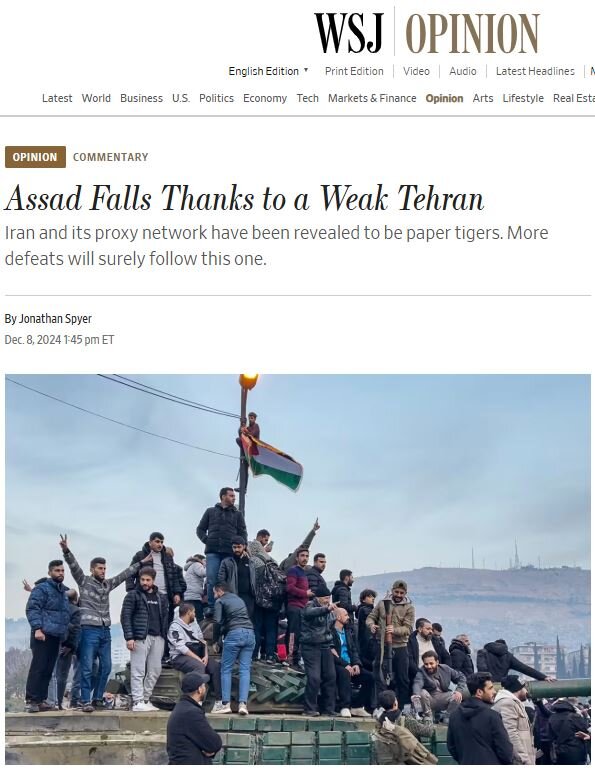Western rejoice at fall of Assad: counting chickens before they hatch!

TEHRAN – The fall of Damascus to a coalition of militant groups, forcing President Bashar al-Assad's exile in a matter of 11 days, surprised many. However, a "regime change" operation in Syria had been underway for years, involving numerous international and regional actors, including terrorist groups.
This is certainly not a good day for the Resistance Axis, but it's not the worst either. Jonathan Spyer's recent Wall Street Journal article, arguing that Assad's fall is due to a weakened Tehran and highlighting Hayat Tahrir al-Sham's severing of Hezbollah's supply lines, misses a crucial point: Resistance movements in Yemen and Gaza have been largely cut off from their supporting countries, yet they persist and will continue to do so.
Furthermore, The Axis wasn't solely dependent on Syria; long before Syria became a logistical hub for the Lebanese resistance, Hezbollah was already a significant force. Israel's war on Lebanon clearly demonstrates this.
Despite constant Israeli airstrikes targeting supply lines and weapons depots, Hezbollah continued operations unimpeded. Hezbollah's robust indigenous missile and drone production capabilities enabled this. The current Lebanese ceasefire isn't a Hezbollah defeat; the group retains the capacity to inflict significant damage on Tel Aviv.
Spyer characterizes the Lebanese ceasefire as a major setback for Hezbollah, falling short of its stated goals against Israel, arguing that "Hezbollah decided that supporting its ally in Gaza was no longer cost-effective." Resistance Axis factions, despite Western claims of Iran controlling all, have been acting autonomously without depending on Tehran. Hezbollah is no different and the decision made by the group is seen more like a tactical pause in a long journey of confronting Israel. The ceasefire in Lebanon is no means of a change in the ideology on which Hezbollah is based.
The author attributes the delay in Tehran's response to the October 26th attacks to "Iran's apprehension over the failure of its Iraqi and Yemeni proxies to breach Israeli air defenses with drones and missiles.” He also claims Tehran is helpless against Israel, but this contradicts both the reality on the ground and Iran's actual approach to West Asian conflicts.
Ansarullah has launched numerous successful attacks on the port of Eilat in southern occupied Palestine, as well as Tel Aviv and other major cities. The Iraqi Resistance has also carried out attacks, targeting not only Israel but also U.S. bases in Syria and Iraq. Conversely, from the outset of Israel's assault on the Gaza Strip, Tehran has sought an end to Tel Aviv's atrocities.
The opening of multiple fronts against Israel aligns with a strategy of peace, not war. The concept of an "Axis of Resistance" aims to deter Israeli aggression. Spyer attributes the fall of the Assad government solely to what he frames as Iran's weakness, neglecting several crucial factors.
The Syrian army was already near collapse when rebels launched their offensive; the attack was the final blow. Since 2011, when foreign-backed militancy began in Syria, the army has been fighting multiple groups simultaneously. In recent years there have been many reports about exhausted army members switching sides due to economic pressures and a lack of morals to fight.
To make matters worse, the U.S. government announced additional sanctions against Syria under the so-called ‘Caesar Act’ in December 2019 which made it difficult for the Assad government to maintain the functionality of the military. It is now obvious that his efforts were not enough.
Other than the military facts Assad refused to reconcile with the armed opposition groups in time and his inflexibility to reform pushed more people to extremism. Iran has been a staunch ally of Assad’s Syria in its fight against terrorism and has provided help in confronting Daesh and other Takfiri terrorist groups. However, this time it was obvious there was no one to be helped and Tehran has not fought anyone’s war for him/her.
The celebrations in Western capitals for the fall of Assad may be short-lived because the overthrow came from not the people of the country but rather from armed opposition groups affiliated with Daesh and Al-Qaeda.
No matter how “rational” they have been acting in the past two weeks, there are still large fears that the situation will be changed in a lightening. The current power vacuum in Syria seems to be a repetition of what happened in Iraq which caused the creation of Daesh and the insurgency that took so many lives in the region. Time may tell that those who cheer for the collapse of the Syrian government were counting chickens before they hatch
Leave a Comment